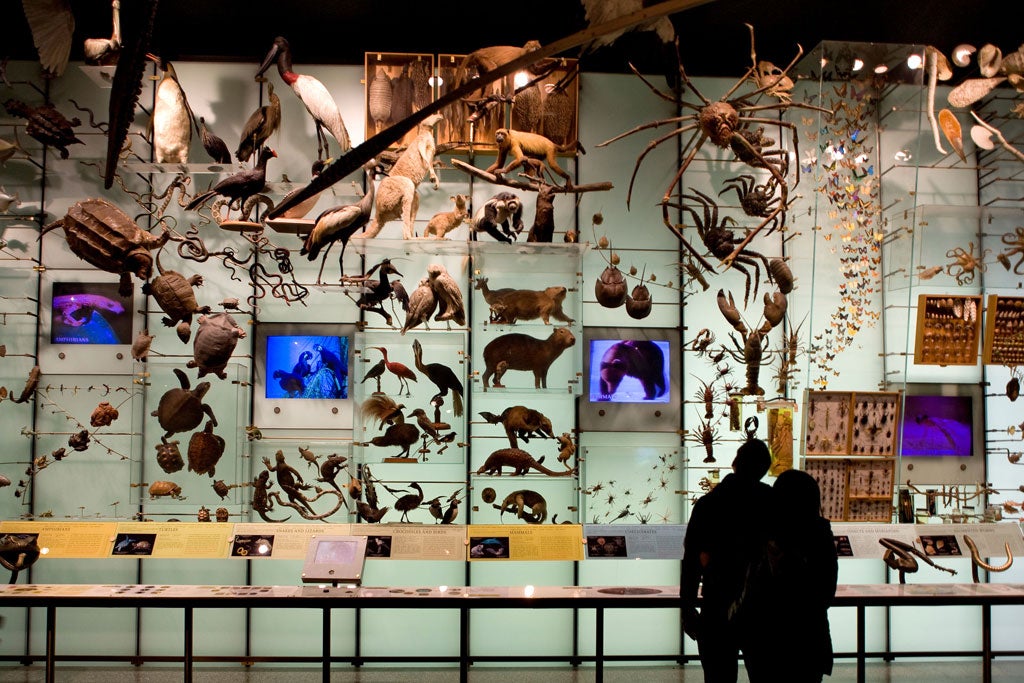Darwin's Ghosts, By Rebecca Stott
Before 'Origin of Species', many European and Arabic thinkers had outlined the principles of natural selection.

Your support helps us to tell the story
From reproductive rights to climate change to Big Tech, The Independent is on the ground when the story is developing. Whether it's investigating the financials of Elon Musk's pro-Trump PAC or producing our latest documentary, 'The A Word', which shines a light on the American women fighting for reproductive rights, we know how important it is to parse out the facts from the messaging.
At such a critical moment in US history, we need reporters on the ground. Your donation allows us to keep sending journalists to speak to both sides of the story.
The Independent is trusted by Americans across the entire political spectrum. And unlike many other quality news outlets, we choose not to lock Americans out of our reporting and analysis with paywalls. We believe quality journalism should be available to everyone, paid for by those who can afford it.
Your support makes all the difference.Charles Darwin was not the first person to observe mutation of species or work on natural selection. Indeed, the notion of evolution was not particularly original in Darwin's time. The idea had existed for centuries.
Numerous scientists had written on the subject; a few had published, with considerable risks to their lives, books that matched On the Origin of Species in scope and brilliance. Rebecca Stott, who grew up in a Creationist household, seeks to shine some limelight on these unsung heroes of evolution.
To begin with, not one but two scientists should be credited with providing a scientific basis for evolution. The young and brilliant Alfred Russel Wallace, who travelled the Malay Archipelago with his servant Ali, had worked out natural selection at about the same time as Darwin. Indeed, Darwin had to rush into publication in 1859 as he feared that Wallace would be seen as the "discoverer" of evolution. The two read their papers jointly at the Royal Society. But Wallace was largely forgotten.
There were other claimants, even during Darwin's time. He was accused of plagiarism in Gardener's Chronicle by Patrick Matthew, a Scottish landowner and fruit farmer. Matthew claimed to have discovered natural selection 28 years before Darwin; he had his book, Naval Timber and Arboriculture, as a proof. Darwin was forced to add a preface to the third edition of Origins giving a line of intellectual descent. It was a list of 30 scientists, including Matthew and Darwin's grandfather, Erasmus. In his Zoomania, published in 1794, Erasmus argued that species had descended from minute aquatic filament swimming in a prehistoric sea.
But the idea of evolution can be traced back much further. On the island of Lesbos, Aristotle observed many different species and tried to discover the patterns behind their apparent diversity. He describes his observation and conclusions in The History of Animals. The cosmos, Aristotle argues, is not ruled by gods but driven from inside itself. While some parts of an animal's body serve a particular purpose, others are simply the outcome of a process. Wherever he looked, Aristotle found evidence of modes of adaptation that ensured the preservation of species.
In contrast to Aristotle, al-Jahiz of Basra, known as "goggle-eyes", was a firm believer in God. That was no impediment to objectivity and critical observation. His The Book of Animals, a massive seven-volume encyclopaedia written between 847 and 867, contains the first extensive study of animals. It comes close, says Stott, to what we would recognise as a theory of evolution and natural selection. Written within a specific genre of classical Muslim scholarship, The Book of Animals combines facts and speculations with poetry, humorous anecdotes, philosophical conjectures, metaphysics, sociology, anthropology and verses from the Qur'an.
What is truly astonishing about The Book of Animals is al-Jahiz's vision of interconnectedness. He constantly uses images of nets and webs. His web of interdependencies foreshadows Darwin's vision of an "entangled web", the extended metaphor Darwin used to distil the key idea of natural selection. Al-Jahiz recognised eco-systems. He observed adaptation, and understood "the survival of the fittest". And, like Aristotle, he believed in spontaneous generation. Then there is Benoit de Maillet, the spymaster of Cairo. In 1697, he published Telliamed or Conversations between an Indian Philosopher and a French Missionary of the Diminution of the Sea, the Formation of the Earth, and the Origin of Men and Animals. Like al-Jahiz's book, this is a grand synthesis of facts, reports and stories from different cultures, all with an accent on natural selection.
In 1749, the French Enlightenment philosopher Diderot claimed that we have emerged from "a multitude of shapeless things" that "could exist themselves and perpetuate themselves" through a "rapid succession of beings". Jean-Baptiste Lamarck, professor at the Jardin des Plantes in Paris, argued for organic evolution and developed a coherent theory in a series of books including Zoological Philosophy. The list goes on.
But were these men evolutionists? Perhaps not in the sense that we understand evolution today. Even Darwin did not claim to be an evolutionist. The point of Stott's book is to show that Darwin stood on the shoulders of giants. There were many starts, true and false, towards the discovery of natural selection. But the end product owes something to all of them. The result is a fascinating history of an idea that is crucial to our understanding of life on earth.
Ziauddin Sardar is co-editor of the journal 'Critical Muslim'
Join our commenting forum
Join thought-provoking conversations, follow other Independent readers and see their replies
Comments